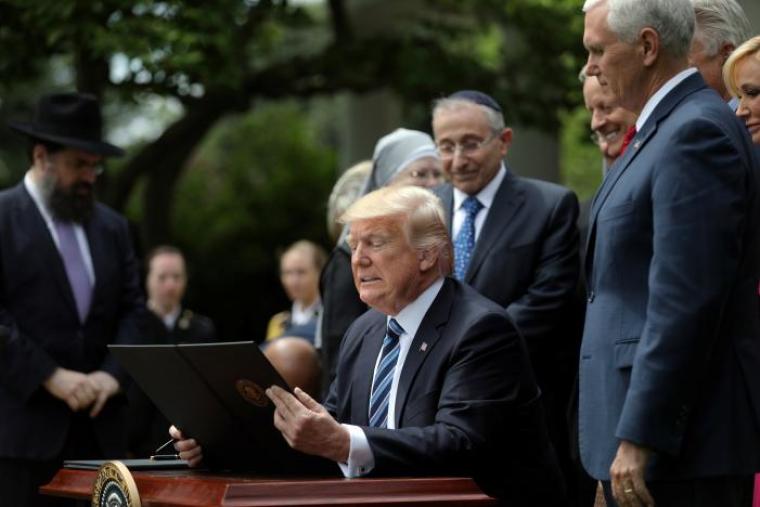Atheist group files suit against Trump's executive order on religious liberty

An atheist group has launched a legal challenge to President Donald Trump's executive order that loosens restrictions on an IRS rule limiting the political activity of religious organizations.
On Thursday, Trump signed the "promoting free speech and religious liberty" order in front of religious leaders during the National Day of Prayer ceremony in the Rose Garden.
One of the provisions of the order eases the enforcement of the Johnson Amendment, which prohibits churches and other nonprofit organizations from engaging in partisan political activities such as endorsing political candidates.
Another provision instructs federal agencies to consider amending the Affordable Care Act's contraception mandate to allow religious organizations to opt out of providing birth control.
Just hours after the order was signed, the Wisconsin-based Freedom From Religion Foundation (FFRF) filed a lawsuit in Madison federal court against President Donald Trump and IRS Commissioner Josh Koskinen. The group argued that the executive order is unconstitutional because it grants preferential treatment to religious organizations.
"Among many faults, the EO requires the IRS to selectively and preferentially discontinue enforcement of the electioneering restrictions of the tax code against churches and religious organizations, while applying a more vigorous enforcement standard to secular nonprofits," the FFRF stated in its complaint, as reported by Courthouse News Service.
The FFRF also contended that the president lacks any power to overturn a legitimate law. The lawsuit is seeking an injunction against the order, and it calls on a federal judge in Madison to instruct the IRS to enforce the restrictions against religious organizations the same as any other nonprofit groups.
"The President's EO attempts to do something for which he has no constitutional authority: selectively veto a legitimate statute that Congress passed and the President signed into law more than 50 years ago," the lawsuit stated.
Meanwhile, the American Civil Liberties Union (ACLU) has abandoned its plan to file a legal challenge against the executive order. The group described the signing ceremony as a photo opportunity with no real policy outcome and contended that the Johnson Amendment remains in force despite the order.
"We thought we'd have to sue Trump today. But it turned out the order signing was an elaborate photo-op with no discernible policy outcome," the organization stated on Twitter.
Some religious conservatives praised the order, but other faith leaders denounced it, saying it would politicize their congregations.
 Christians don't have to affirm transgenderism, but they can’t express that view at work: tribunal
Christians don't have to affirm transgenderism, but they can’t express that view at work: tribunal Archaeology discovery: Medieval Christian prayer beads found on Holy Island
Archaeology discovery: Medieval Christian prayer beads found on Holy Island Presbyterian Church in America votes to leave National Association of Evangelicals
Presbyterian Church in America votes to leave National Association of Evangelicals Over 50 killed in 'vile and satanic' attack at Nigerian church on Pentecost Sunday
Over 50 killed in 'vile and satanic' attack at Nigerian church on Pentecost Sunday Ukrainian Orthodox Church severs ties with Moscow over Patriarch Kirill's support for Putin's war
Ukrainian Orthodox Church severs ties with Moscow over Patriarch Kirill's support for Putin's war Islamic State kills 20 Nigerian Christians as revenge for US airstrike
Islamic State kills 20 Nigerian Christians as revenge for US airstrike Man who served 33 years in prison for murder leads inmates to Christ
Man who served 33 years in prison for murder leads inmates to Christ


 Nigerian student beaten to death, body burned over ‘blasphemous’ WhatsApp message
Nigerian student beaten to death, body burned over ‘blasphemous’ WhatsApp message 'A new low': World reacts after Hong Kong arrests 90-year-old Cardinal Joseph Zen
'A new low': World reacts after Hong Kong arrests 90-year-old Cardinal Joseph Zen Iran sentences Christian man to 10 years in prison for hosting house church worship gathering
Iran sentences Christian man to 10 years in prison for hosting house church worship gathering French Guyana: Pastor shot dead, church set on fire after meeting delegation of Evangelicals
French Guyana: Pastor shot dead, church set on fire after meeting delegation of Evangelicals ‘Talking Jesus’ report finds only 6% of UK adults identify as practicing Christians
‘Talking Jesus’ report finds only 6% of UK adults identify as practicing Christians Mission Eurasia ministry center blown up in Ukraine, hundreds of Bibles destroyed: 'God will provide'
Mission Eurasia ministry center blown up in Ukraine, hundreds of Bibles destroyed: 'God will provide' Church holds service for first time after ISIS desecrated it 8 years ago
Church holds service for first time after ISIS desecrated it 8 years ago Burger King apologizes for 'offensive campaign' using Jesus' words at the Last Supper
Burger King apologizes for 'offensive campaign' using Jesus' words at the Last Supper Uganda: Muslims abduct teacher, burn him inside mosque for praying in Christ’s name
Uganda: Muslims abduct teacher, burn him inside mosque for praying in Christ’s name